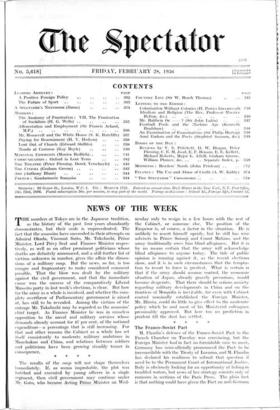The Franco-Soviet Pact M. Flandin's defence of the Franco-Soviet Pact
in the French Chamber on Tuesday was convincing, but the Foreign Minister had in fact no-formidable case to meet. Germany has semi-officially pronounced the Pact to he irreconcilable with the Treaty of Locarno, and M. Flandin has declared his readiness to submit that question if need be to the Permanent Court of International Justice. Italy is obviously looking for an opportunity of fishing in troubled waters, but news of her strategy consists only of rumours in sections of the Paris Press. The plain fact is that nothing could have given the Pact an anti-German aspect but the attitude of Germany herself. M. Flandin followed his Prime Minister, M. Sarraut, in the cordiality of his references to Germany, and some better response than has so far been forthcoming is merited. Germany herself, if apparently credible .reports _arc accurate, is very wisely planning extended conunercial relations with Russia. Out of that some measure of political detente may develop. Trade makes employment, and if ,Europe were at work Europe would not be murmuring of war, and the famine-fed Communism which Germany professes to dread would be exorcized. As to the Franco-Soviet Pact, the sooner it is ratified and the consequences of ratification faced openly, the better. But the Senate has to deal with the matter yet, and delaying tactics, rather on thC American -model, by the Pact's opponents arc expected.























































 Previous page
Previous page